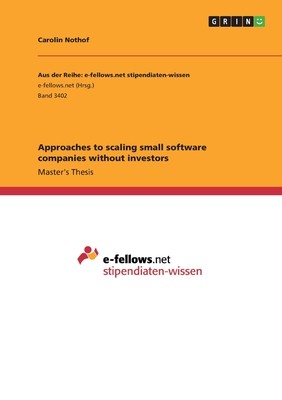
- We will send in 10–14 business days.
- Author: Carolin Nothof
- Publisher: GRIN Verlag
- Year: 2020
- Pages: 104
- ISBN-10: 334619888X
- ISBN-13: 9783346198884
- Format: 14.8 x 21 x 0.6 cm, softcover
- Language: English
- SAVE -10% with code: EXTRA
Approaches to scaling small software companies without investors (e-book) (used book) | bookbook.eu
Reviews
Description
Master's Thesis from the year 2020 in the subject Business economics - Information Management, grade: 1,3, University of Applied Sciences Kaiserslautern, language: English, abstract: Venture capital funded companies are far more present in the media than organically grown companies. This makes us erroneously assume that there is only one way to building a successful company: by raising VC (venture capital). The truth is, however, that only a tiny fraction of all small businesses obtains VC in the course of their life span. In fact, from all the companies aspiring to receive funding through VC, 99% will never achieve this objective. Among the 1% that does achieve funding, there are companies that have to go out of business because they get overfunded and lose their focus. Others recognize that entrepreneurs and investors have fundamentally different motivations, especially regarding the exit. Therefore, growth-oriented founders of tech companies wonder whether it is possible for them to scale without investors, and how they can approach to do so. This thesis aims to provide answers to these two questions, primarily by investigating companies that have already scaled successfully and by extracting the main lessons from their growth journey.
EXTRA 10 % discount with code: EXTRA
The promotion ends in 20d.17:35:25
The discount code is valid when purchasing from 10 €. Discounts do not stack.
- Author: Carolin Nothof
- Publisher: GRIN Verlag
- Year: 2020
- Pages: 104
- ISBN-10: 334619888X
- ISBN-13: 9783346198884
- Format: 14.8 x 21 x 0.6 cm, softcover
- Language: English English
Master's Thesis from the year 2020 in the subject Business economics - Information Management, grade: 1,3, University of Applied Sciences Kaiserslautern, language: English, abstract: Venture capital funded companies are far more present in the media than organically grown companies. This makes us erroneously assume that there is only one way to building a successful company: by raising VC (venture capital). The truth is, however, that only a tiny fraction of all small businesses obtains VC in the course of their life span. In fact, from all the companies aspiring to receive funding through VC, 99% will never achieve this objective. Among the 1% that does achieve funding, there are companies that have to go out of business because they get overfunded and lose their focus. Others recognize that entrepreneurs and investors have fundamentally different motivations, especially regarding the exit. Therefore, growth-oriented founders of tech companies wonder whether it is possible for them to scale without investors, and how they can approach to do so. This thesis aims to provide answers to these two questions, primarily by investigating companies that have already scaled successfully and by extracting the main lessons from their growth journey.


Reviews